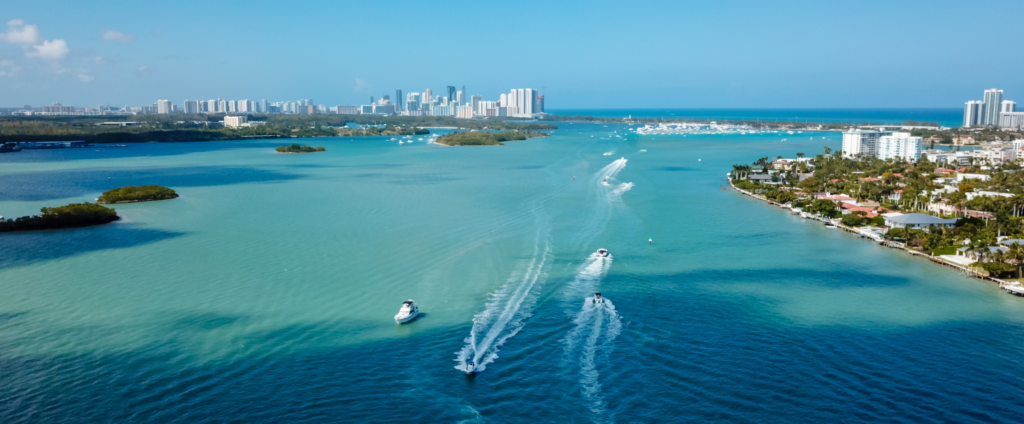
Launched in 2022, the We <3 Biscayne Bay campaign is a public education initiative designed to raise awareness about key sources of pollution impacting Biscayne Bay. The campaign focuses on three core areas: fertilizer education, responsible pet ownership, and litter prevention. These behaviors, when left unchecked, contribute to declining water quality, algal blooms, seagrass die-offs and fish kill events.
Through engaging outreach efforts such as Yappy Hour, drain art installations, and digital and physical advertising, the campaign encourages residents and visitors to adopt environmentally responsible practices.
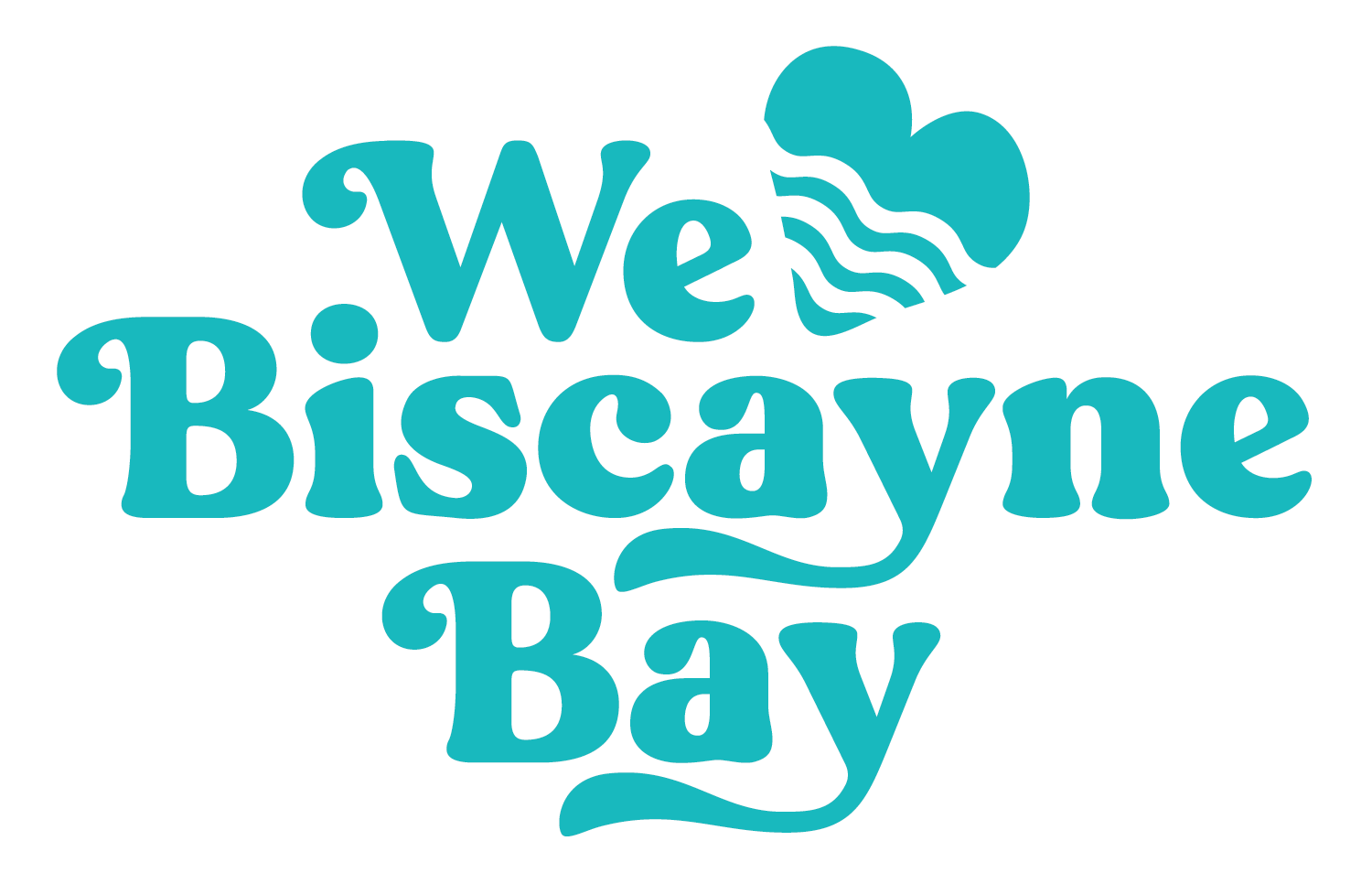
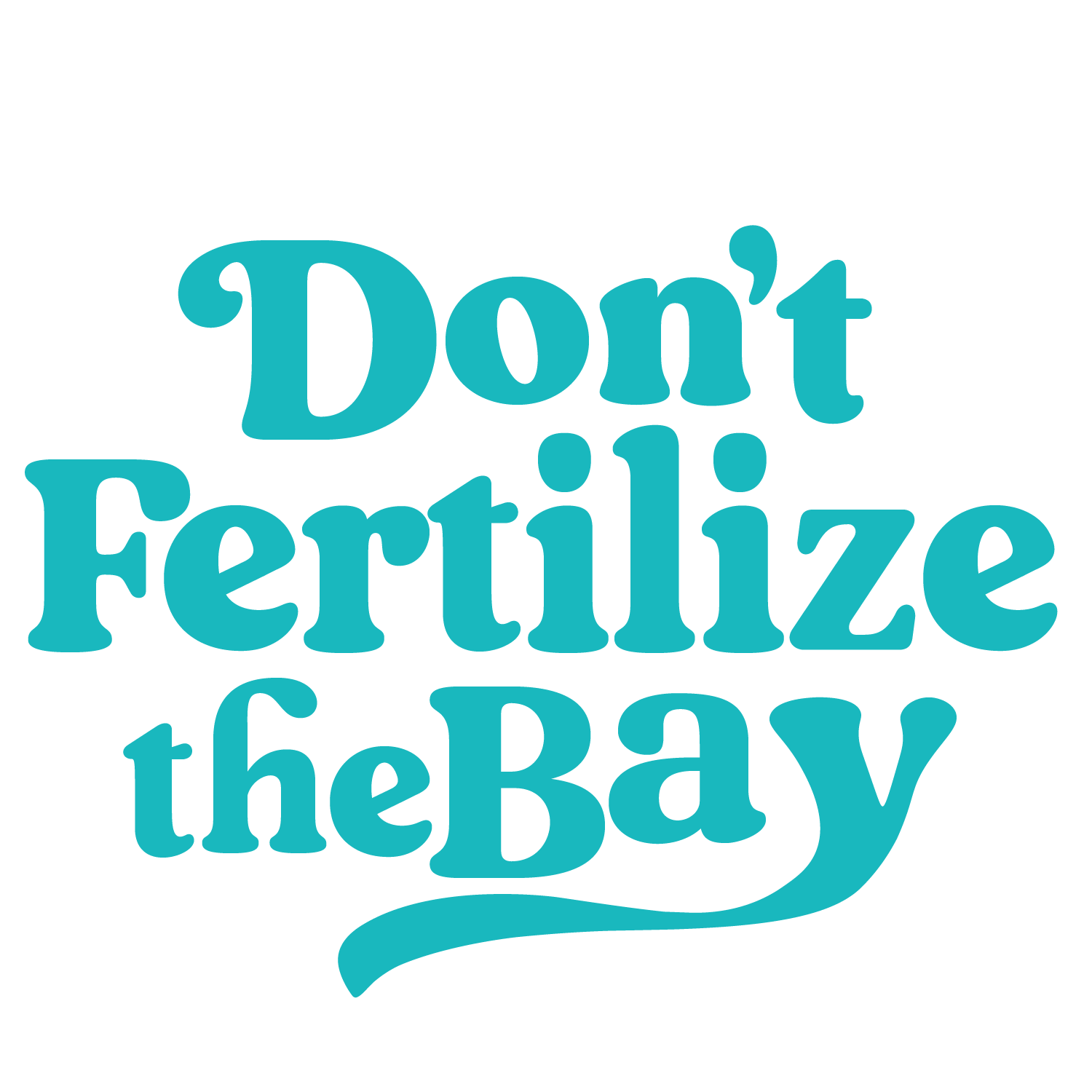
Fertilizer application in Miami Beach is prohibited from May 15th through November 1st.
Excessive or incorrect fertilizer use has been found to lead to algal blooms. When it rains, fertilizers are carried as runoff into our waterways. Improper fertilizer use not only impacts our waterways, but it can also lead to long-term degradation of the soil.
Keep your lawn and garden fertilizer and pesticide-free and keep your grass, yard waste, and other pollutants out of storm drains. Click here to learn more about fertilizer management practices and resources.
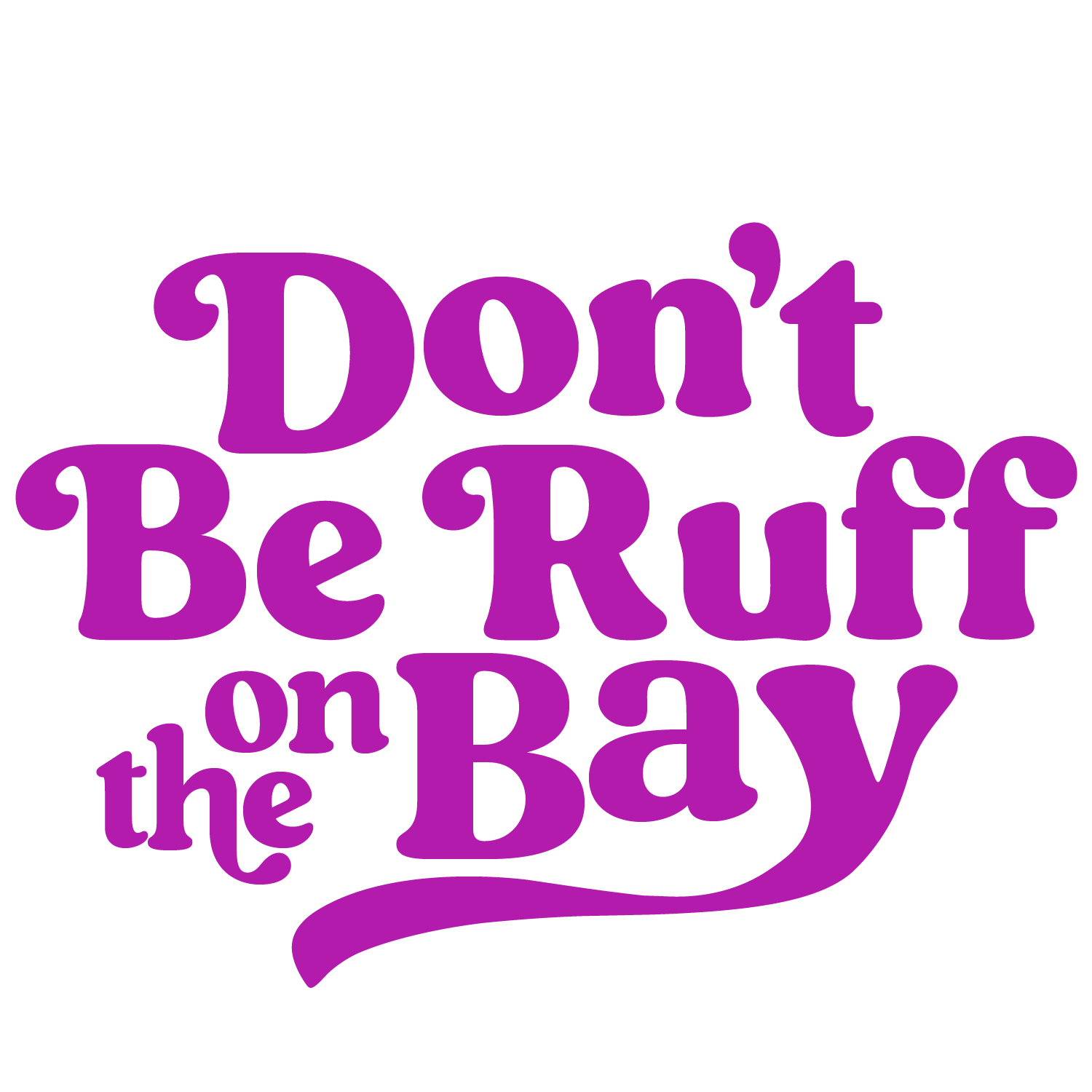
Owning a pet is a huge responsibility. Not only do they need to be loved, fed, and walked - but their waste needs to be picked up properly!
Pet waste takes a huge toll on the environment when not cleaned up properly. It is the third biggest pollutant affecting our water quality because it contains nitrogen and phosphorous which can deplete oxygen needed by marine life to survive.
Pet waste also has high amounts of fecal coliform, a disease-causing bacteria. A single gram of pet waste contains approximately 23 million fecal coliform bacteria; one dog can produce over 7.82 billion fecal coliform bacteria in a single day. Even if you don’t live near a body of water, rain and irrigation can mix it with stormwater runoff where it can then seep into our soil or drain through the stormwater system.
What is the city doing?
- Installing new pet waste stations and maintaining existing ones
- Regular water quality testing
- Education and outreach
What can you do?
- Clean up after your dog using one of the many pet waste stations located in the city.
- Spread the word! Let your neighbors know how pet waste can impact quality of life.
Chapter 10 of the City Code requires the removal of animal feces.
- For a first offense, a $50 fine.
- For a second offense within the preceding 12 months, a $100 fine.
- For each additional offense within the preceding 12 months, a $200 fine

Responsibly interact with the land, coast, and water of Biscayne Bay. Litter has been known to clog stormwater drains and cause flooding within the urban environment.
- Plastic bags and plastic wrap can asphyxiate marine animals and fish.
- Trash, such as cigarettes, can also be fatally harmful to animals due to their non-biodegradable qualities.
- Pollutants degrade the quality of life and lessen the recreational value of our natural environment. Additionally, they can decrease the desirability of our neighborhoods, which can result in a reduction of property values.
Help Miami Beach stay beautiful by minimizing pollution! Both residents and visitors must do their part to reduce the pollution that enters the City’s vast system of streets, interconnected waterways and sensitive marine habitats.
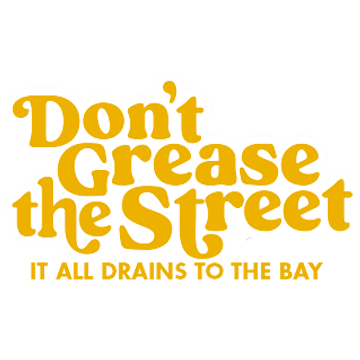
Proper disposal of grease, oil and cleaning liquids is crucial. Washing kitchen mats and equipment in alleys, as well as having unkept trash rooms, result in grease, oil and chemicals flowing into storm drains, which ultimately drain into Biscayne Bay — harming water quality and marine life.
Restaurant owners and operators that engage in these practices risk receiving two (2) violation notices with fines from the Code Compliance Department.
- As pursuant to Sections 90-101, 90-36:
First Offense: $1,000
Second and Subsequent Offenses: $2,000 - As pursuant to Section 46-234(a):
First Offense: $500 plus cleanup fees
Second Offense*: $1,000 plus cleanup fees
Third or Subsequent Offenses*: $5,000 plus cleanup fees
*Within 12 months of first offense
To prevent pollutants from reaching Biscayne Bay or the ocean, always clean mats and equipment over your kitchen drain, ensuring that grease flows directly into grease traps for proper disposal.

Keep Fats, Rags, Oils and Grease out of the drain.
Fats include both animal and vegetable fats used for cooking and preparing food.
Rags include wipes, paper towels, tissues and other disposable cleaning cloths.
Oils include cooking oils, salad dressings and sauces.
Grease includes meat drippings, bacon fat, butter, margarine and gravy.
Why should you care? It all drains to Biscayne Bay!
F.R.O.G. coats the inside of pipes, reducing their capacity. Eventually it will cause the flow of wastewater to back up and trigger an overflow. F.R.O.G. can cause serious damage to the sewage system, your property and that of your neighbors, as well as contaminate streets and waterways from sewage overflows. Cleanup can be very costly, and this expense is reflected in higher bills for residents.
Do your part. Protect your pipes and the Bay.
Violators are subject to fines per City Codes:
- Sections 90-101, 90-36
First Offense: $1,000
Second and Subsequent Offenses: $2,000 - Sections 46-234(a)
First Offense: $500.00 plus clean-up fees
Second Offense (within twelve months of first offense): $1,000 plus clean-up fees
Third or Subsequent Offenses (within twelve months of first offense): $5,000 plus clean-up fees
Biscayne Bay is one of the most valuable natural resources in South Florida. It is an important estuary that provides critical habitat and other ecological, environmental, and economic benefits to the region. Designated as an aquatic park and conservation area by Miami-Dade County and enjoyed by millions of residents and visitors every year, the Bay provides habitat for a myriad of fauna and flora including some endangered species.
More than 800 species can be found in the Bay including more than 500 fish species and more than 150 species of shrimp, crabs, and lobsters, along with migratory birds which roost and forage in the estuary. Biscayne Bay also welcomes several species of sea turtles including the Atlantic Green Turtle, the Atlantic Hawksbill, the Leatherback, the Atlantic Ridley, and the Loggerhead.
The seagrass beds throughout Biscayne Bay support important fisheries and help stabilize sediments in the Bay while attenuating wave energy from hurricanes and other storms. In addition to providing critical habitat, the Bay’s clear waters support the regional economy, recreation, and tourism.
Plastic Straw and Stirrer
The use of single-use plastic straws and stirrers is prohibited in Miami Beach. These items are frequently littered and can harm marine life when they enter the water.
Styrofoam and Extension of the Ordinance
Styrofoam products, including coolers, cups, and food containers, are banned. These materials break down slowly, leach toxins and are commonly found as litter in coastal areas.
Balloon, Metallic and Plastic Confetti Ban
Balloons, metallic and plastic party decorations are not permitted in marinas, parks and beaches. Once released or discarded, they often end up in the ocean, where they pose serious threats to birds and marine animals.
Fertilizer
Improper fertilizer use contributes to nutrient pollution and harmful algal blooms. The city has adopted seasonal restrictions and best practices to reduce fertilizer runoff into stormwater systems and the Bay. Fertilizer application in Miami Beach is prohibited from May 15 through November 1.
Water Quality Ordinance
Miami Beach’s Water Quality Ordinance outlines standards for pollution prevention, stormwater management and discharge control. The city exceeds federal requirements under the National Pollutant Discharge Elimination System (NPDES), reinforcing its commitment to clean water.
The Biscayne Bay Marine Health Summit Steering Committee created guide for citizens to follow and help address the actions that can harm Biscayne Bay.
View or download the guide below:
Biscayne Bay Task Force Recommendations (Summary):
Biscayne Bay Task Force SUMMARY (1)
Biscayne Bay Task Force Recommendations (Full Report):
Biscayne+Bay+Task+Force+Report+and+Recommendations+June+2020+-

